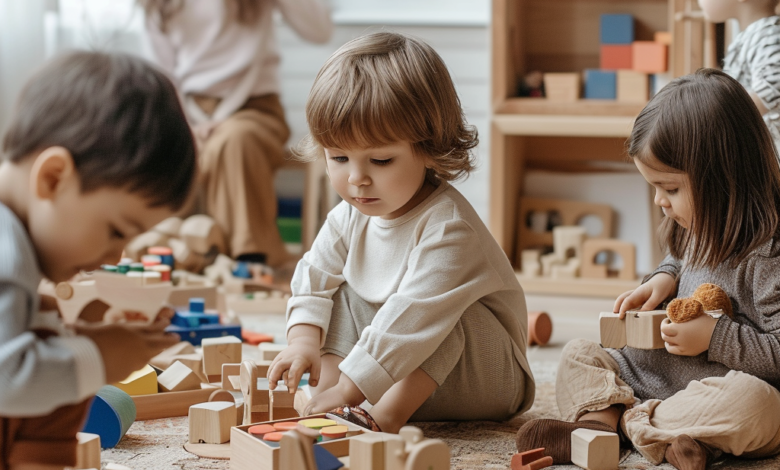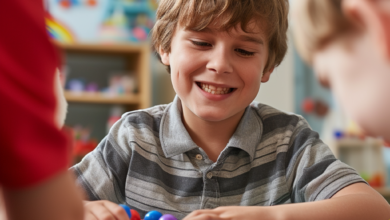Montessori vs. Daycare: Understanding the Differences in Childcare

- Philosophical Differences
- Curriculum and Learning Style
- Classroom Environment
- Teacher-Child Interaction
- Socialization and Community
- Flexibility, Cost, and Accessibility
Choosing the right childcare option for your child is a significant decision that can impact their development, learning, and daily life. Two popular choices among parents are Montessori schools and traditional daycare centers. While both aim to provide safe, nurturing environments for children, their approaches to care, education, and child development differ greatly. This article delves into the distinctions between Montessori and daycare settings to help parents make an informed choice.
Philosophy and Approach
Montessori: Child-Centered Learning
The Montessori method, developed by Dr. Maria Montessori in the early 20th century, emphasizes child-centered learning. It encourages children to explore and learn at their own pace within a prepared environment. The focus is on fostering independence, self-discipline, and a love for learning. Montessori classrooms are designed to cater to different learning styles and allow children to choose activities that interest them, promoting individualized learning experiences.
Daycare: Care-Focused Environment
Traditional daycares primarily focus on providing care for children while their parents are at work. Although many daycare centers incorporate educational activities, their main goal is to ensure children’s safety and meet their basic needs, such as meals, rest, and playtime. The approach is typically more structured and group-oriented, with activities designed for the collective needs and interests of the children in care.
Curriculum and Learning
Montessori: Self-Directed Learning
The Montessori curriculum is designed around self-directed learning, with materials and activities that support sensory-motor activities, practical life skills, language, mathematics, and cultural understanding. Children work independently or in small groups, often with materials that are self-correcting to facilitate learning through discovery. Teachers act as guides, observing and introducing new materials when a child is ready to progress.
Daycare: Structured Activities
Daycares often follow a more traditional and structured curriculum, with scheduled times for various activities such as arts and crafts, storytime, and outdoor play. These programs may not be as individualized as the Montessori approach, focusing more on group activities that encourage social interaction and basic skills development.
Environment and Materials
Montessori: Prepared Environment
A Montessori classroom is meticulously organized, with learning materials accessible on low shelves for children to choose freely. The environment is designed to be calm, orderly, and aesthetically pleasing, with natural light, plants, and real-life materials that appeal to a child’s sense of exploration and curiosity. The setup is intended to encourage independence, with child-sized furniture and tools that enable children to take care of their own needs and learning.
Daycare: Play-Based Setting
Daycare environments are typically more relaxed, with an emphasis on play areas and group activities. While educational materials are present, the focus is more on providing a variety of toys and play equipment that cater to the children’s entertainment and gross motor skills development. The setting is often vibrant and colorful, designed to stimulate and engage children in a fun, secure atmosphere.
Teacher-Child Interaction
Montessori: Guided Independence
In Montessori settings, teachers observe and guide children rather than direct their activities. They are trained to recognize when a child is ready to advance in a particular area and introduce appropriate materials to challenge and stimulate learning. The teacher’s role is more of a facilitator of learning, encouraging children to explore and learn through their own initiative.
Daycare: Supervision and Support
In daycares, staff members provide closer supervision and more direct interaction with children. They lead activities, provide care, and ensure the children’s safety throughout the day. While they also support learning and development, the interaction tends to be more about managing the group and maintaining routines.
Socialization and Community
Montessori: Mixed-Age Groups
Montessori classrooms often consist of mixed-age groups, typically spanning 3 years. This setup allows younger children to learn from older peers and for older children to develop leadership skills and empathy by helping the younger ones. This approach fosters a sense of community and collaboration among students.
Daycare: Age-Specific Groups
Daycares usually organize children into groups based on age to tailor activities and care to the developmental stages of the children. This can provide a social environment where children develop friendships with peers their own age, though it may limit the opportunities for older-younger peer learning and mentoring found in Montessori settings.
Flexibility and Scheduling
Montessori: Consistent Routine
Montessori schools typically have a consistent daily routine, allowing children to develop a sense of security and independence within the structure. The schedule includes large uninterrupted blocks of work time, promoting deep engagement with materials and activities.
Daycare: Flexible Care Options
Daycares often offer more flexible scheduling options to accommodate the varying needs of families, including part-time and full-time care, early drop-off, and late pick-up times. This flexibility makes daycare a practical choice for parents with unpredictable or demanding work schedules. The focus is on providing reliable care, even if it means less consistency in daily routines compared to Montessori settings.
Cost and Accessibility
Montessori: Investment in Education
Montessori schools can be more expensive than traditional daycare options due to their specialized curriculum, materials, and teacher training. The cost reflects an investment in a child’s early education and development, emphasizing a unique, individualized learning experience. However, this can also mean Montessori education might not be accessible to all families due to financial constraints.
Daycare: Varied Cost Range
Daycare costs vary widely depending on the facility, location, and services offered. Generally, daycares provide a more cost-effective solution for childcare, especially for families looking for basic care needs and flexible hours. Financial assistance and subsidies are often more readily available for daycare services, making them more accessible to a broader range of families.
Making the Right Choice for Your Child
When deciding between Montessori and daycare, consider your child’s personality, learning style, and your family’s needs and values. Montessori may be the right choice if you prioritize individualized education, self-directed learning, and a prepared environment that encourages independence. If your primary need is flexible, reliable care, or if cost is a significant factor, a traditional daycare might be more suitable.
Visit potential facilities, observe classrooms, and talk to educators and other parents to get a feel for the environment and philosophy in practice. Remember, the best choice is one that aligns with your child’s needs and your family’s circumstances, providing a supportive, nurturing environment for your child to thrive.
Last words
Choosing between Montessori and daycare is a significant decision that can influence your child’s early development and learning experience. Both options offer unique benefits, from the child-centered, individualized approach of Montessori to the flexible, care-focused environment of daycare centers. Understanding the differences between these childcare options is crucial in making an informed decision that best suits your child and family. Ultimately, the right choice depends on aligning the childcare setting with your child’s needs, your educational values, and your logistical requirements, ensuring a positive, enriching experience for your child.

